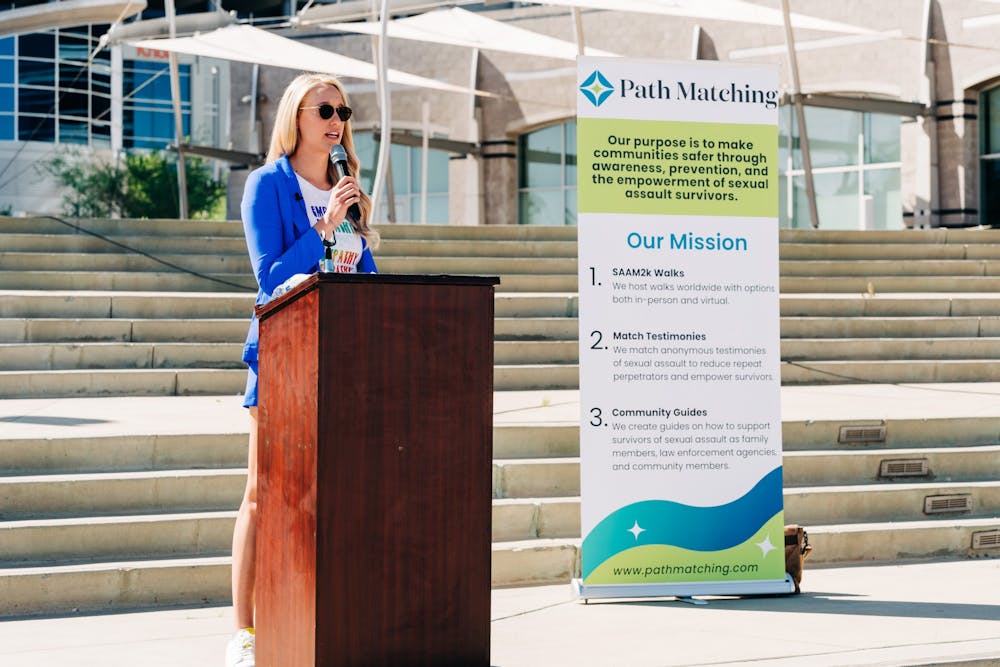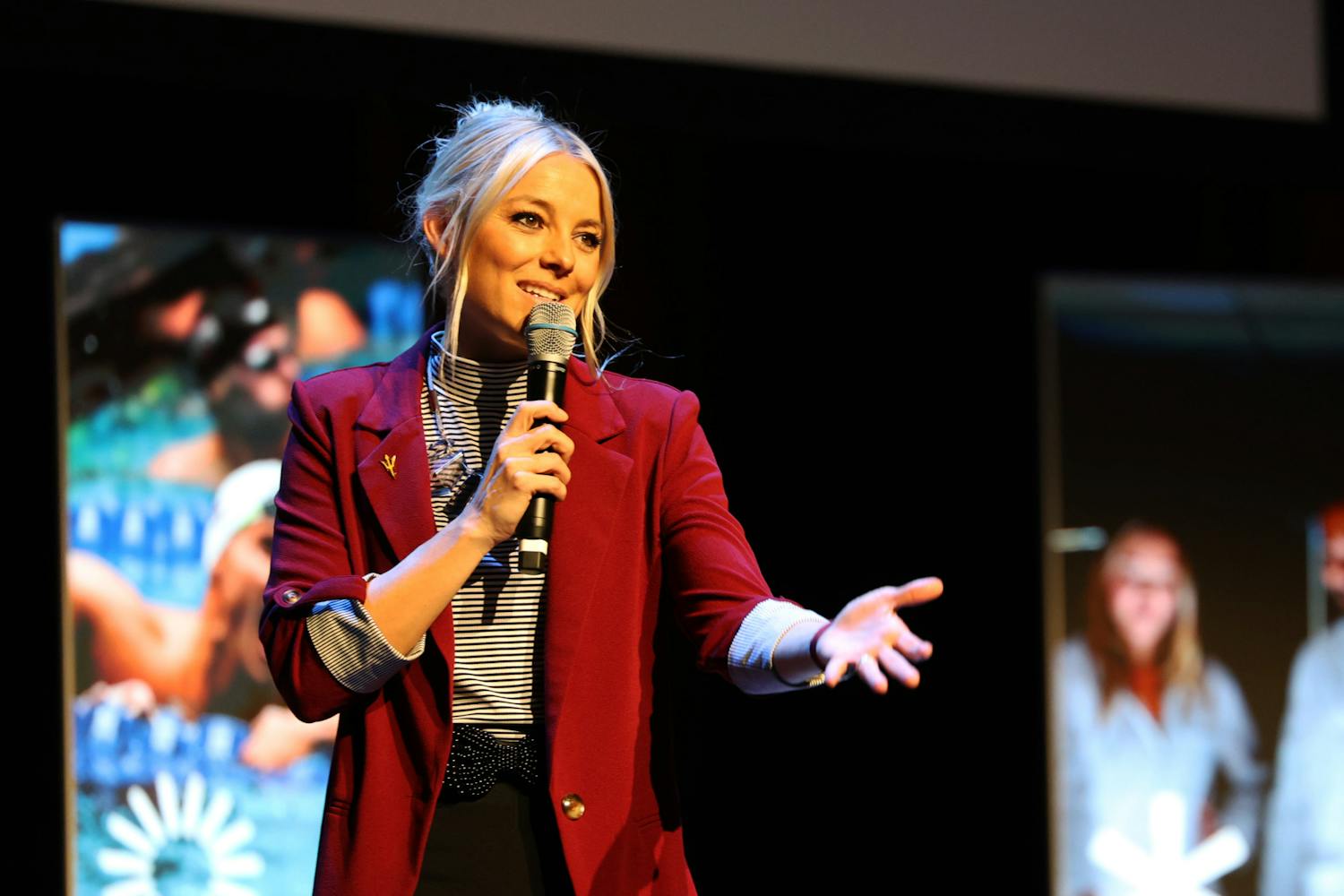ASU alumna Samantha Vrcic is the founder of Path Matching, a Tempe-based nonprofit aiming to create safer communities and empower sexual assault survivors through case matching, awareness walks and educational guides.
Vrcic graduated in 2020 with a bachelor's degree in communications and currently works as the chief of staff of software developing firm AKOS. As a sexual assault survivor herself, she started the nonprofit in 2019 hoping to promote awareness, safety and a sense of community among those who have gone through similar experiences.
"Our mission is to make communities and universities safer through the awareness and empowerment of sexual assault survivors," Vrcic said. "It has evolved from a technology company to also be an organization focused on creating trauma-informed communities."
Fueled by her own experience with sexual assault, Vrcic seeks to do what she can to assist other survivors with getting the help they need.
"Recently, this past year, I've been able to receive more support, but throughout my whole journey, there was no support from family, law enforcement, or school, so to provide someone else with that support and love that I needed is my goal," Vrcic said.
Through the Path Matching website, survivors are able to anonymously submit testimonies. After their submission, the organization analyzes data in the report in an attempt to match testimonies based on time, location, description and the perpetrator's first and last name. The organization hopes its work in matching testimonies can lead to a greater number of cases being taken to court, as repeat offenses can be much easier to track.
After realizing multiple friends had been assaulted by the same perpetrators, Vrcic taught herself to code in order to make the program. It began as an app, transitioning to a reporting program within the site.
"On two separate occasions, two of my friends who didn't know each other were assaulted by the same man and just from them telling me like what had happened, I realized that it was the same person," she said. "From there, it really lit a fire underneath me to find some way to combat these repeated cases."
In addition to identifying repeat offenders, Path Matching now works to connect survivors to each other in hopes to build a network of support. The organization notifies survivors when similarities in their testimonies are found and allows them to exchange contact information.
"This gives survivors the ability to move forward legally, or even just to get together and heal," she said. "There's amazing power in coming together with those that have experienced something so similar and being able to create that community."
Most recently, Vrcic spent the past three months organizing the state's first Sexual Assault Awareness Month Walk, which was held on April 16 at Tempe Town Lake in an effort to raise awareness and cultivate an in-person community of support. Attendees were encouraged to wear teal to show support and signal that they were a safe person to talk to.
"As survivors it's so hard to talk about and to create a safe place, especially in person," Vrcic said. "The purpose of these walks is so that we can see that this is happening every day and there are people around us who support us and are there for us and there are resources out there as well."
In addition to the walk, the event featured a meditation specialist, fitness expert and yoga therapist who provided alternative coping mechanisms, as well as a stage where survivors had the opportunity to share what had happened to them and how they persevered. Twelve partner nonprofit organizations were in attendance at tables around Neil G. Giuliano Park, providing attendees with resources for physical and mental assistance.
"The entire walk was (Vrcic's) idea from start to finish," Jake White, volunteer operations director for Path Matching, said. "We had probably over 150 people come out and join us for the walk, and then had fitness leaders join us and really help attempt to create a space that was accessible to people, regardless of their experience."
Jacquilyn Pace, an attendee, was hesitant to attend the event as a sexual assault survivor, not sure how she would react to hearing or talking about assault, but was surprised by her experience and the environment that the walk cultivated.
"Stuff like this is important to me because I want to help spread awareness about it, but also because it's important to find safe places and events where I’m able to talk more about it or even just listen and find different resources that might help me," Pace said.
Vrcic's overall mission is "to empower people worldwide through technology," allowing global connections through their online platform. Path Matching will be hosting a virtual version of the Sexual Assault Awareness Walk on April 30 over Zoom to increase accessibility and to allow for those unable to attend in person to have the same access to resources.
This coming year, the team plans to create guidebooks educating family members, universities and law enforcement agencies on how to best support survivors. Vrcic is also in the process of creating a quiz to help survivors easily get the targeted assistance they need and connect with partner nonprofits.
Her personal experience recovering from assault has helped her in her advocacy for other survivors, and assists her in making personal connections to those in need of support.
"It was really hard seeing everything that she had to go through in the aftermath of the assault, and I'm just so proud of her," Path Matching volunteer Michelle LaFever said. "She turned all of it into a cause to help other people. The fact that she's been through this kind of stuff and she knows how it feels really helps her connect with the people she’s trying to help."
In addition to her own work, Vrcic was the keynote speaker at the ASU Take Back the Night event, hosted by the Council of Coalitions earlier this month, to teach students about the existence of the site, promote the awareness walk and speak on the importance of trauma-informed communities.
"I want to create technology where we're not just helping survivors in one city, we’re helping survivors worldwide, whether that's through creating virtual walks, matching software, or any of our online quizzes or guides," Vrcic said.
Reach the reporter at sabuggle@asu.edu and follow @sadie_buggle on Twitter.
Like The State Press on Facebook and follow @statepress on Twitter.

Sadie Buggle is the Editor of the State Press Opinion Desk. This is her third semester working for the State Press after two semesters reporting for the Community and Culture Desk.




